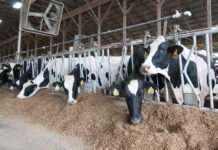The Latin American region of Mexico, Central America and South America imports nearly one billion bushels of wheat annually, with 368 million bushels coming from the United States. Imports from the U.S. are expected to increase to more than 500 million bushels by 2050.
Fostering relationships with this expanding market has been a long-term priority of U.S. Wheat Associates (USW), the export market development organization for the U.S. wheat industry. USW holds a Latin American Buyers Conference every other year.
Attended by 97 participants representing 16 countries, this year’s conference was held July 18-20 in Brazil, as a way to nurture relationships between U.S. wheat farmers and buyers in the region.
“It’s significant that the conference was held in Brazil this year because Brazil is one the world’s leading wheat importers,” said Kansas Wheat CEO Justin Gilpin.
At the forefront of this year’s conference was the apprehension of a growing number of trade policy concerns. This was quickly replaced with the excitement and abundance of opportunities available from U.S. Wheat Associates and the 2018 U.S. wheat harvest.
USW President Vince Peterson illustrated the changing dynamics of global wheat trade and increased competitiveness from Russia and other non-traditional importers into the region. Mark Fowler, Vice President of Overseas Operations, followed up by highlighting the need for providing increased value for our U.S. wheat customers through additional technical service.
“U.S. Wheat Associates continues, with the variety of quality provided by the six classes of U.S. wheat available, to remain the best choice for our customers in Latin America,” said Fowler. “As the market becomes more competitive and our customers strive to differentiate their products to their customers, our ability to provide the technical service and product development assistance becomes even more vital to our success.”
Dr. Romulo Lollato, Extension Wheat Specialist at Kansas State University, spoke on “The Role of Agricultural Extension on Wheat Quality: A Case Study For Hard Red Winter.”
According to Gilpin, Lollato was able to communicate to buyers about what Kansas wheat farmers are putting into their crops for both management and quality.
“Buyers have a better understanding of what goes into the production and management of Kansas wheat for quality,” Gilpin said. “This will help differentiate us in a competitive marketplace.”
Aaron Harries, Vice President of Research and Operations for Kansas Wheat, said this conference is a chance for farmers to meet these buyers face to face, show their appreciation for their business and to allow them ask questions of the people who grow the wheat they are buying.
“I hope that the buyers and attendees appreciate the transparency we show,” Harries said. “We fully disclose information about the crop, even in years when our wheat crop isn’t that good. I hope they come away from the conference knowing that if they seek any information or expertise, we have that readily available for them.”
Harries said his biggest takeaway was that the emerging and expanding markets for Kansas wheat are going to be in Central and South America, because logistically it a lot easier to ship wheat from the United States to South America. It’s becoming cost prohibitive to ship U.S. wheat halfway around the world.
“Meeting with international wheat buyers in Latin America is important because we export half of the wheat that we grow every year. It is important for farmers to have those markets,” Harries said. “We try to continue fostering relationships with the buyers. Currently, the Latin American region imports 25 million metric tons (918.6 million bushels) of wheat annually, which is expected to increase to 35 million metric tons (1.286 billion bushels) by 2050. The U.S. enjoys 40 percent of that market share.”
by Kaitlyn Vicker, Communications Intern




